In the ever-evolving world of SEO, structured data—specifically schema markup—has become a critical tool for improving visibility in search results. Schema markup allows websites to communicate with search engines by providing additional context about their content. However, even small mistakes in this process can have significant consequences. From missing required properties to invalid schema types, these errors can lead to poor performance in local search results, reduced click-through rates, and even penalties from search engines.
For businesses that rely on local visibility, such as restaurants, retail stores, or service providers, understanding and avoiding common schema markup mistakes is essential. In this article, we’ll explore the most frequent errors and provide actionable steps to fix them, ensuring your business appears accurately and effectively in search results.
What Is Schema Markup and Why It Matters
Schema markup is a form of structured data that helps search engines understand the content of a webpage. It’s essentially a code added to a website’s HTML that provides additional information about the page, such as details about a business, products, events, or reviews.
In the context of local SEO, schema markup plays a crucial role. By using the right schema types—such as LocalBusiness, Review, or Event—you help search engines like Google better understand your business’s location, hours of operation, contact details, and other important information. This leads to improved visibility in local search results, richer snippets, and more accurate representation in local packs.
Without proper schema markup, your business may miss out on valuable search features, and search engines may struggle to present your content correctly. Thus, schema markup is not just beneficial—it’s essential for local SEO success.
How Schema Markup Impacts Local SEO Performance
Properly implemented schema markup can significantly boost your local SEO efforts by:
- Improving Visibility: Search engines display rich snippets or knowledge panels for businesses with correct schema markup, providing potential customers with key information directly on the search results page. This increased visibility can result in higher click-through rates (CTR) and more foot traffic.
- Enhancing User Experience: Schema markup benefits users by making your business information easily accessible and easy to read. Customers can quickly find essential details like your business name, address, phone number, and reviews, leading to improved user experience.
- Increasing Local Relevance: Proper schema markup helps search engines understand the geographic relevance of your business, which improves rankings in local search queries.
- Boosting Local Packs: Businesses with well-implemented schema markup are more likely to appear in Google’s local pack, increasing their chances of attracting local customers.
However, when errors occur, these benefits can be undermined, leading to missed opportunities and lower engagement.
Step-by-Step Implementation Framework
To avoid schema markup mistakes, follow this structured approach:
- Define or Audit the Current Situation
- Start by auditing your existing schema markup using tools like Google’s Structured Data Testing Tool or Google Search Console.
-
Identify any missing properties, incorrect schema types, or formatting issues.
-
Apply Tools, Methods, or Tactics
- Use the appropriate schema type for your business (e.g., LocalBusiness for a physical store, Review for customer feedback).
- Ensure all required fields are included, such as business name, address, phone number, and geo-coordinates.
-
Validate your markup using tools like the Rich Results Test or Schema Markup Validator.
-
Measure, Analyze, and Optimize
- Monitor how your schema markup performs in search results using Google Search Console.
- Track improvements in CTR, local rankings, and user engagement after fixing errors.
- Regularly update your schema markup to reflect changes in your business, such as new locations, hours, or services.
By following this framework, you can ensure your schema markup is both effective and error-free, maximizing its impact on local SEO.
Real or Hypothetical Case Study
Consider a local coffee shop in New York that struggled with low visibility in local search results. After implementing LocalBusiness schema and adding Review schema for customer testimonials, they fixed missing properties and corrected invalid schema types. As a result, their rankings improved by 15% in local search results, and their listing began appearing in Google’s Local Pack, leading to a 30% increase in walk-in customers.
Another example involves a law firm that fixed Event Schema to mark up their webinars. This change resulted in their events appearing in rich snippets, leading to an increase in sign-ups and a 20% rise in consultations from organic search traffic.
These case studies highlight the tangible benefits of correcting schema markup errors and the positive impact it can have on local SEO performance.
Tools and Techniques for Schema Markup
To implement and maintain effective schema markup, consider using the following tools:
- Google’s Structured Data Testing Tool: A powerful tool for testing individual pages and identifying errors in your schema markup.
- Google Search Console: Provides reports on structured data issues and helps monitor how Google interprets your markup.
- Rich Results Test: Checks your schema markup against Google’s rich results guidelines and offers a preview of how your content will appear in search results.
- Schema Markup Validator: A free tool that identifies errors or inconsistencies in your schema markup.
- JSON-LD Generator: Helps create and validate JSON-LD formatted schema markup, which is preferred by Google.
Using these tools ensures that your schema markup is accurate, compliant, and optimized for search engines.
Future Trends and AI Implications
As AI continues to shape the future of search, schema markup will play an even more critical role. With the rise of voice search, multimodal search, and AI-powered assistants, structured data becomes essential for ensuring your business is recognized and understood by these systems.
Search engines like Google are increasingly relying on structured data to deliver more accurate and relevant results. For example, featured snippets and voice search responses often draw from schema markup to provide quick, concise answers to user queries.
To stay ahead, businesses should focus on maintaining clean, accurate schema markup and staying updated with evolving best practices. Embracing AI-driven tools for schema validation and optimization can also help streamline the process and improve overall SEO performance.
Key Takeaways
- Avoid Missing Properties: Ensure all required fields, such as business name, address, and phone number, are included in your schema markup.
- Use the Correct Schema Type: Choose the right schema for your business type to ensure accurate representation in search results.
- Validate Your Markup: Regularly test and validate your schema markup using tools like Google’s Structured Data Testing Tool.
- Update Frequently: Keep your schema markup up-to-date to reflect any changes to your business, such as new locations or hours.
- Monitor Performance: Track the impact of your schema markup on local SEO metrics, such as CTR and rankings.
By avoiding common schema markup mistakes and implementing best practices, you can significantly improve your local SEO performance and ensure your business stands out in search results.
Meta Title: Schema Markup Mistakes That Can Backfire and How to Avoid Them
Meta Description: Learn the top schema markup mistakes that can hurt your local SEO and how to fix them. Improve visibility, click-through rates, and search rankings today.
SEO Tags (5): #LocalSEO #SchemaMarkup #StructuredData #SEO #LocalBusiness
Internal Link Suggestions: [Parameter #1: Schema Markup Best Practices], [Parameter #2: Local SEO Optimization], [Parameter #3: Structured Data Validation]
External Source Suggestions: https://developers.google.com/search/docs/, https://search.google.com/search-console, https://schema.org











